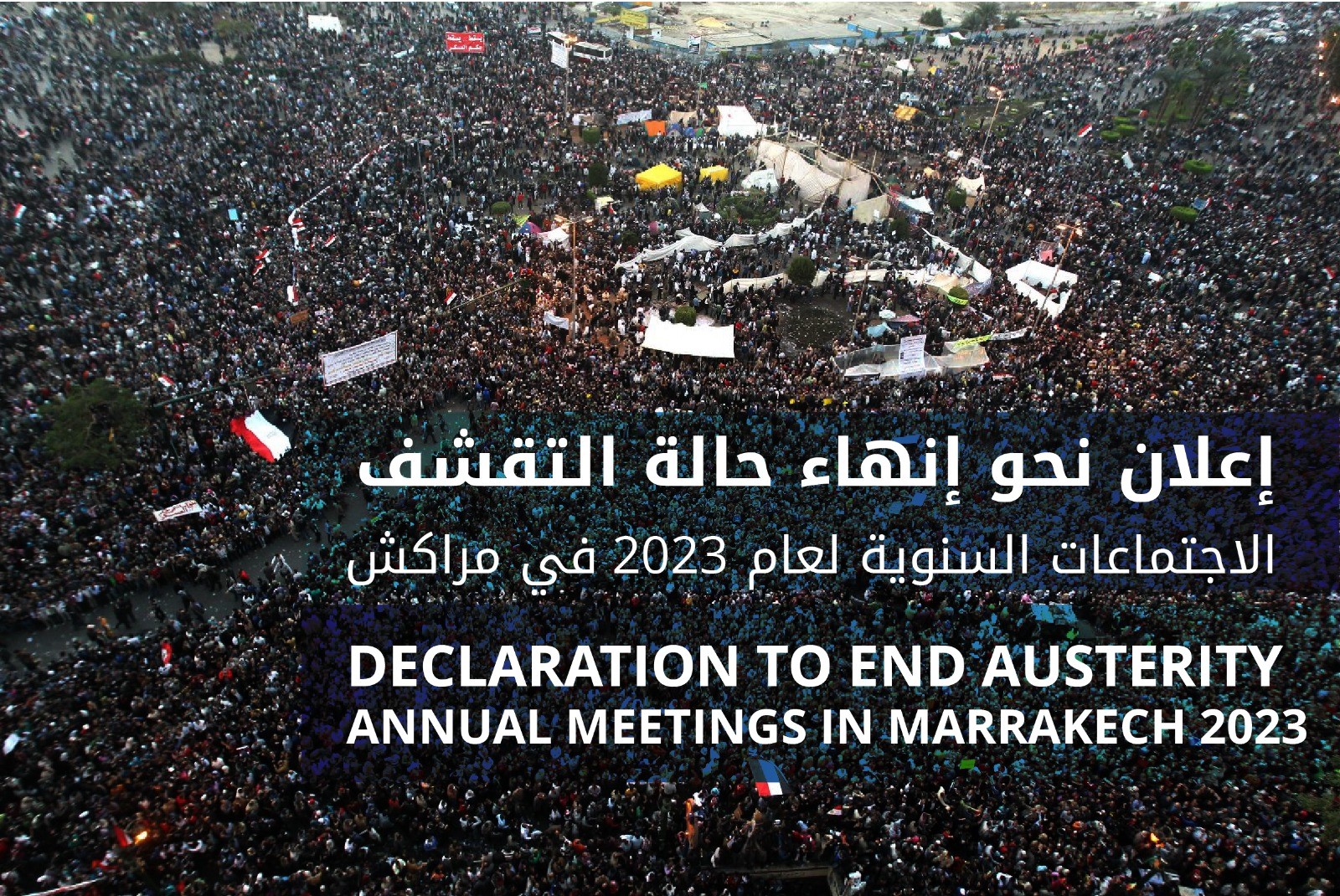We, civil society representatives and academics from all over the world, call upon governments, Ministries of Finance and International Financial Institutions to end austerity.
Today, more than 6 billion people are suffering from austerity, so-called “fiscal consolidation”, amid a cost-of-living crisis. We demand that governments immediately stop harmful public budget cuts in essential areas like education, health and social protection, and halt damaging reforms such as the privatization of public services and social security rights, which are exacerbating gender inequality, as women are the shock absorbers due to the subsidy they provide to the global economy through their unpaid domestic and care work. Instead of austerity cuts/reforms, governments must seek new sources of fiscal space to meet their Human Rights obligations and achieve the UN Sustainable Development Goals.
Specifically, we, the undersigned civil society organizations, trade unions and academics demand that governments, Ministries of Finance, the IMF, World Bank and other International Financial Institutions urgently:
1. Stop slashing much needed budgets for social protection, education, health, public transport, housing and other social programs;
2. Stop cuts or caps to the wage bill, in particular for the number and salaries of teachers, health and social workers, as well as civil servants at the local level;
3. Stop reducing subsidies that support households;
4. Stop pension and social security reforms that result in lower benefits, and avoid reducing employers’ contributions to social security (“tax wedge”) to ensure that systems are equitable and sustainable;
5. Stop labor flexibilization reforms;
6. Stop privatizations and public-private partnerships in socially relevant areas, often disguised as “State-Owned Enterprise reforms”;
7. Stop the adherence to private finance-first approaches, such as the World Bank’s Cascade approach, that deepen the false financing solution of macroeconomic and financial dependence on corporate actors and private capital;
8.
Stop any other budget cuts or reforms with negative social impacts, particularly on women.
We urge International Financial Institutions, governments and Ministries of Finance to implement financing alternatives, mainly:
– Increase progressive taxes on corporations, the financial sector and the rich, including corporate and personal income and wealth taxes, excess profits, taxes to windfall profits, digital services, and financial transaction taxes; instead of regressive taxes such as VAT/Sales taxes;
– Review, cancel and stop signing socially harmful tax agreements such as bilateral tax treaties and harmful tax incentives to corporations;
– Reduce/eliminate sovereign debts, so debt service does not reduce social expenditures;
– Provide countries with access to swift and orderly debt restructuring where needed, while including private creditors also in debt restructuring on a mandatory basis.
– Scrap harmful fiscal ceilings or fiscal rules that don’t allow investing public resources to fight the climate emergency or inequality.
– Increase employers’ contributions to social security to ensure the sustainability of social security systems, and formalize workers in the informal economy with decent contracts;
– Fight illicit financial flows, such as money laundering, natural resources crimes, trade mispricing, and tax evasion, all illegal; and join forces to combat global tax abuse by supporting a UN Tax Convention and Tax Body; invest adequate resources to support an effective and progressive tax reform;
– Tap into fiscal and foreign exchange reserves, so that national savings are invested in people and sustainable development today;
– Assess critically the gendered and inequality impact of all austerity policies/reforms as well as of the financing alternatives, to ensure equitable outcomes;
– Ensure higher levels of development aid by donors, reaching the UN target of 0.7% of their Gross National Income (GNI) and ensure climate financing is new and additional, while providing compensation for loss and damage arising from climate change.
The fact that decisions affecting the life and welfare of millions of people are taken behind closed doors in Ministries of Finance and International Financial Institutions is bad governance. Decisions on public finance should be accountable to parliaments and citizens. We, civil society representatives, trade unions and academics, demand that governments take decisions transparently in national social dialogue, jointly with free trade unions, federated employers and representative CSOs, to ensure good governance and the achievement of Human Rights and the Sustainable Development Goals, and provide a viable and urgently-needed alternative to austerity and growing social pain.
SIGNATORIES:
ORGANIZATIONS
• ActionAid International
• Bretton Woods Project (BWP)
• Center for Economic and Social Rights (CESR)
• EURODAD
• Equidad de Género: Ciudadanía, Trabajo y FamiliaEquidad de Género: Ciudadanía, Trabajo y Familia
• Financial Transparency Coalition (FTC)
• Global Social Justice (GSJ)
• IBON International
• MenaFem Movement for Economic, and Ecological Justice
• OXFAM International
ACADEMICS/INDIVIDUALS
• Sir Richard Jolly, Institute of Development Studies, University of Sussex, UK.
• Jayati Ghosh, Professor of Economics at the University of Massachusetts Amherst, USA
• Juan Somavia, former Director General of the UN International Labour Organization
• Pierre Sane, former Secretary General of Amnesty International and Assistant Director-General UNESCO
• Prof. Cephas Lumina, former UN Independent Expert on foreign debt and human rights, and Member, UN Committee on the Rights of the Child
• Jomo Sundaram, former Assistant Secretary-General at the UN Department of Economic and Social Affairs and at the FAO
• Juan Pablo Bohoslavsky, researcher CONICET, Argentina, and former UN Independent Expert on economic reform policies and foreign debt.


